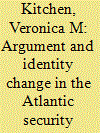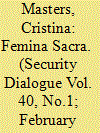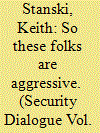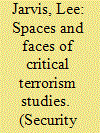|
|
|
Sort Order |
|
|
|
Items / Page
|
|
|
|
|
|
|
| Srl | Item |
| 1 |
ID:
086335


|
|
|
|
|
| Publication |
2009.
|
| Summary/Abstract |
The Atlantic community shares more than just dependable expectations of peaceful change. Its members also share a reflexive political community they sense is worth preserving and a view that their security is intertwined. Existing accounts of the Atlantic security community have identified the importance of renewed emphasis on common values as a factor in preserving and expanding the security community after the Cold War. But, debates at the end of the Cold War also turned on the question of what the allies would do together and what responsibilities they had to each other and to other states. This article outlines a discursive framework and a set of rhetorical strategies used by members of the Atlantic community that explain how they worked to maintain and change their community during debates about their mandate for cooperation. This framework is then applied to the Atlantic community's debates over common action during the Yugoslav wars.
|
|
|
|
|
|
|
|
|
|
|
|
|
|
|
|
| 2 |
ID:
086332


|
|
|
|
|
| Publication |
2009.
|
| Summary/Abstract |
The significance of the threat of bioterrorism lies in the fear that it generates, `threat' in this context constituting not just a physical manifestation of impending danger but also a reflection of a subjective vulnerability derived from a fear of an eventuality that cannot be predicted, identified or controlled. It is a threat that plays upon our perceived biological vulnerabilities in a contemporary environment where biotechnological innovation has reconfigured European relations to biological threat and where security is increasingly informed by risk. Confronting the threat of bioterrorism in Europe, then, necessarily requires engaging with the fear associated with it. This article argues that it is by conceptualizing bioterrorism through the notion of `dread risk' that this can best be accomplished. In so doing, it elucidates the manners in which perceptions of threat interact with articulations of security to inform a cyclical threat-defence dynamic, enabling a more explicit engagement with the ways in which Europe is not only subject to biological insecurity but also a facilitator of it.
|
|
|
|
|
|
|
|
|
|
|
|
|
|
|
|
| 3 |
ID:
086331


|
|
|
|
|
| Publication |
2009.
|
| Summary/Abstract |
This article inquires after women with whom we have seemingly become intimately familiar in the `war on/of terror'. On one hand, it asks after women such as Jessica Lynch and Lynndie England, examining how US female soldiers have been represented in the `war on/of terror'. On the other hand, it also inquires after some women we do not know at all - women who have largely remained faceless, nameless, figural, reduced to the snapshot of the veil - the women on behalf of whom this war is claimed to be waged. In so doing, it asks the question: What do any of these women have in common? The article explores how women in the `war on/of terror' have in common their silence, erasure and radical exclusion, in varied degrees, from politics. This has been effected through particular representational politics wherein women have been written over and against one another - American women over and against Afghan and Iraqi women, Jessica Lynch over and against Lynndie England. Accordingly, we fail to make connections across difference, and never ask after that which appears at the margins of the text, at the edges of the screen, on the borders of the photograph. This article, therefore, seeks to ask after these margins, edges and borders. It seeks to ask after femina sacra.
|
|
|
|
|
|
|
|
|
|
|
|
|
|
|
|
| 4 |
ID:
086334


|
|
|
|
|
| Publication |
2009.
|
| Summary/Abstract |
Afghan warlords' are some of the most maligned actors in US debates about Afghanistan. These figures are vilified as exemplifying some of the darkest moments in Afghanistan's recent history. Yet, they are also lauded for their contributions to the future of the Afghan state or, in some cases, recast as seemingly less vicious characters, such as `local commanders' or `militia leaders'. This article situates US conceptions of `Afghan warlords' in a historical and comparative context by returning to arguably the West's most formative exposure to Afghanistan, the First Anglo-Afghan War (1838-42). A discursive analysis of primary and secondary sources from both periods reveals that longstanding Orientalist archetypes about the `Afghan people' and their violent tendencies continue to influence US thought about `Afghan warlords'. The article concludes that recent concern about `Afghan warlords' should be understood as part of the longer, and still unresolved, construction of a violent Afghan `Other' in Anglo-American political thought.
|
|
|
|
|
|
|
|
|
|
|
|
|
|
|
|
| 5 |
ID:
086327


|
|
|
|
|
| Publication |
2009.
|
| Summary/Abstract |
This article explores the burgeoning academic interest in establishing a critical terrorism studies research programme. It begins by reviewing the debates over definition, causation and response that still dominate mainstream discussions of terrorism. The analytical and normative limitations of these debates, it argues, open considerable space for the emergence of a critically oriented body of literature. A second section then explores two distinct efforts at overcoming these limitations: the broadening and interpretivist faces of critical terrorism studies. The broadening face refers to attempts to expand our understanding of terrorism beyond non-state violence alone, while the interpretivist face comprises critical explorations of terror in image and narrative. Although each of these approaches offers scholars a more engaged role than the problem-solving orientation of the mainstream debates, the article argues that only the interpretivist face is capable of addressing their analytical limitations. The article concludes by calling for further attention to the notion of critique within the relevant critical literature.
|
|
|
|
|
|
|
|
|
|
|
|
|
|
|
|
|
|
|
|
|